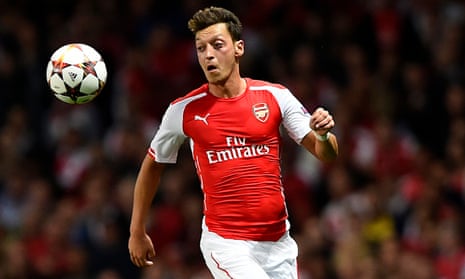There is, as always, a sense of necessary deflation in the imminent closing of the Premier League transfer window, of an overdue sedative mercifully administered. Most notably in the case of Manchester United, who seem to have become convinced over the summer that the best way to rebuild their champion team is to assemble the most disparate, eccentric-looking group of human beings they can possibly find – Louis van Gaal! Ángel di María! Luke Shaw! A stilt walker! A curate with a limp! – like a four-year-old preparing a surprise Sunday breakfast by hurling every single thing in the fridge into a bowl and marching grandly back upstairs with it all on a tray.
Yet for all the noise it has still been a fairly sober set of new arrivals. So much so that, for the neutral, it is hard to avoid the feeling the most interesting player in this season’s Premier League turned up almost exactly a year ago to the day, returning now as the chief creative talent in a World Cup-winning team but still in England a source of deliciously more-ish exasperation. Oh, Mesut. What – if indeed anything at all – are we going to do with you?
There was even something deliciously unsatisfying about Mesut Özil’s part in Arsenal’s victory over Besiktas in midweek. What better moment, the pre-match publicity had suggested – with defeat threatening to curtail not only the Champions League season but also that sense of gears clunked into place on some as-yet-undefined new Arsenal era – for the record signing to pull himself up to his full height, take the game by the scruff and spread that cool, clear, laser-guided talent all over the full 90 minutes at the Emirates.
Or perhaps not. Instead, Özil responded by becoming more Özil-ish than ever. In the course of 77 minutes on the pitch he had no shots at goal, committed no fouls and was caught offside no times, a ghost presence lost between the lines right up until the moment he produced that snaked little sideways pass, fizzed across in search of Jack Wilshere, that led to the only goal of the tie for Alexis Sánchez. This, the Özil-ites will say, is what he does. Is it enough? Why doesn’t he do more of it?
It is a measure of Özil’s bafflingly enigmatic presence that four years on from his emergence as a world star at South Africa 2010 he still seems like a player who is yet to explore the outer fringes of his own talent, the most enticingly unfulfilled 25-year-old World Cup winner out there. Is he the best purely creative player on the planet? The definitive expression of the Deutscher Fussball-Bund’s grand historical triumph? Is he, come to think of it, actually any good at all?
Certainly at times last season Özil resembled not so much a high-end creative midfielder as some beautifully frail alien prince being ferried around from pitch to pitch by 10 dedicated human helpers yoked into fawning submission by his regal Martian glaze. In many ways his signing still looks like an act of mild debauchery for this lopsided Arsenal team, with its amusingly insistent excess of attacking midfield talent.
There is an argument that Özil simply isn’t the right player to build a team around, that he is only ever going to be a high-end component part, a needy little genius whose moments of fine-point inspiration arrive as a kind of repartee with those already at his level. Runs must be made, spaces found, angles devised, into which Özil’s own brilliantly gymnastic range of movement and passing will elegantly tessellate. Some might even say Özil has simply been lucky, that he is a kind of placebo footballer whose presence provides a garnish on trophies that would have arrived in any case, like the world’s greatest triangle player waiting in the wings to apply the perfect final tinkle with a single flex of a princely hand.
This, though, is to ignore Özil’s undeniable strengths. He may be a maverick talent, a player of absences for whom even the bad games are fascinating to watch but this isn’t a unique quality in itself. Wayne Rooney’s bad games are also gripping, in the same way watching an angry, dying walrus slowly collapsing into the tundra can still be an interesting spectacle – but the goal assists and chances created just keep on coming, even when at times he appears to be barely there himself.
Of course, Özil will surely improve this season. So far at Arsenal his main task has been managing the transitions from defence to attack but he needs company to make this work and large parts of February and March this year were spent stuck in the same pattern of fruitless movement, haring off on his own down the left wing, cutting back inside, haring off a bit more, and then repeating it all again like a shopping trolley with a broken wheel. Perhaps with the muscular, pacy, Cristiano-esque presence of Sánchez alongside him this year might be a little different.
Plus, it might just be worth paying a tiny bit of attention to what the rest of the world sees. Cristiano Ronaldo was said to be “furious” when Özil left Madrid, thereby depriving him of a fellow on-field seer and visionary. José Mourinho once compared Özil to Zinedine Zidane without attracting a chorus of enraged dissent from France. Not that the comparison really works. Zidane was a heavy artillery canon of a player, his talents – the swivel, the nudged passes the zigzagging dribbles – always highly visible. Whereas Özil at his best is a gossamer presence, a player who seems to see elite modern football’s reduced spaces as a kind of balletic mathematical challenge to be unpicked by stealth, carrying around with him at all times that flickering mental flowchart of movements and spaces and possibilities.
There is no doubt Özil will continue to frustrate those in England who prefer a more tangible sense of snap and snarl. But still, in a sport that has been so carefully parcelled out and broken down and lassoed with numerical registers of worth, it is heartening that football can still find a space for an elite-level player whose merits are so open to question, so unquantifiable at times, so hilariously and stubbornly spectral. Carry on, Mesut. As you were. We will – as ever – see you when we see you.

